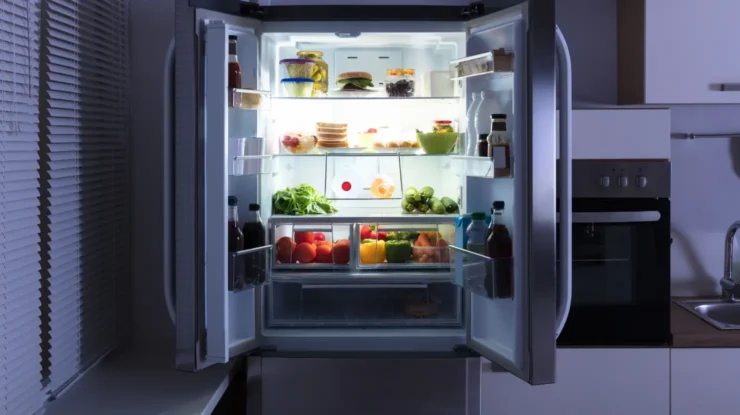Ask any household, and they’ll tell you that a refrigerator is the center of their kitchen. It’s also one of the appliances driving your electricity bill according to the EIA, accounting for 6-7% of your household power usage. How much electricity does your refrigerator use, and just how much is it costing you? Let’s find out.
Key Takeaways
- A typical refrigerator uses between 300 and 800 watts.
- Usage (kWh) usage depends on the refrigerator’s size, type and age, as well as the surrounding temperature in the kitchen.
- Assuming the typical 400 watt refrigerator, the cost comes down to $16 per month and $190 per year.
In this article:
- Refrigerator Electricity Usage: It’s a Trick Question
- How Much Electricity Does a Refrigerator Use?
- Calculating Your Refrigerator’s Energy Usage
- Electricity Usage Calculator Tool: Refrigerator
- How to Reduce Your Refrigerator’s Energy Footprint
- Why a Garage Fridge is an Energy Hog

Refrigerator Electricity Usage: It’s a Trick Question
Normally, it’s easy to simply calculate kilowatt hours (kWh) used. To find kWh used, multiple the watt hours used (watts * number of hours used), then divide by 1000.
But here’s why calculating your refrigerator’s energy usage is a trick question.
While your refrigerator keeps things cold 24/7, the motor doesn’t run 24 hours a day. Typically, your fridge is only using electricity for only 1/3 of the day, or around 8 hours per day.
This is called the number of running watts.
Your refrigerator accounts for approximately 4% of energy usage in your home. Check what uses the most electricity in your home.
How Much Electricity Does a Refrigerator Use?
The wattage on modern refrigerators is anywhere from 300 to 800 watts of electricity, although actual usage can vary.
Assuming the typical 400 watt refrigerator, the cost comes down to $16 per month and $190 per year. For Texas residents, these numbers are a little lower: about $14 per month and $170 per year. (Based on average US and Texas electricity prices for August 2024.)
When tracking your energy consumption, understand that multiple factors are behind these figures:
- Your usage will depend on the efficiency of the model, the temperature of your home and where it’s located in your kitchen.
- Older-model refrigerators are less energy-efficient. Additionally, Energy Star-certified systems are nearly 10 percent more efficient than modern refrigerators without the Energy Star label.
- Size matters: The smaller the refrigerator, the less energy it consumes. In fact, a mini-fridge draws just 50 to 100 watts of power!
- Design plays a role: Top-mounted refrigerators require less power than side-by-side models.
Calculating Your Refrigerator’s Energy Usage
Of course, our electric bills don’t list how much energy your refrigerator and other appliances use. It’s up to you to figure it out. On the other hand, doing so isn’t that difficult. Here’s how you can calculate your refrigerator’s energy usage:
Time needed: 5 minutes
How to Calculate Refrigerator Energy Usage
- Locate your wattage sticker inside your refrigerator.
Look inside your refrigerator door to find the wattage sticker. The sticker will either show the specific wattage, like the example shown below, or it will show volts and amps. To calculate total wattage, multiply the number of volts times the number of amps.

- Calculate daily watt-hours your refrigerator uses
While they keep your food and drinks cold 24/7, refrigerators cycle on and off throughout the day. Multiply your wattage by 8 hours, which is the amount of time it typically runs (1/3 of a 24 hour day). This will give you the total watt-hours per day.
- Calculate kilowatt hours used by your refrigerator.
For kilowatt hours (kWh, how electricity is measured), divide watt-hours per day by 1000.
- Calculate the cost to run your refrigerator.
Once you have the number of kilowatt hours (kWh) per day, multiply the kilowatt hours by your electricity price per kilowatt hour (kWh). That give you the total kWh your refrigerator consumes each day.
Here it is shown as a mathematical equation (in case the teacher wants to see your work!)
Watts * 8 = watt-hours per day
Watt-hours per day / 1000 = kWh/day
Electricity Usage Calculator Tool: Refrigerator
Now that you know the math behind it, here’s an easier way. In the energy usage calculator tool below, we show daily, monthly and annual usage for a typical refrigerator.
How much electricity does a typical 400 watt refrigerator use?
| Usage | |
|---|---|
| Daily Usage | 3.2 kWh |
| Monthly Usage | 96.0 kWh |
| Annual Usage | 1152.0 kWh |
Daily usage calculation is (watts * daily hours) / 1000.
Use the tool below to calculate how much electricity your refrigerator uses and its cost. Just enter your appliance wattage, the amount of time your fridge is running (hint: 8 hours per day) and your energy rate to see how much your refrigerator costs you daily, monthly and annually.
Calculate electricity usage for your appliances.
| Wattage | |
| Hours Used Daily | |
| Energy Rate (¢/kWh) |
Your energy usage and cost for this appliance is :
| Usage | Cost | |
|---|---|---|
| Daily Usage | ||
| Monthly Usage | ||
| Annual Usage |
How to Reduce Your Refrigerator’s Energy Footprint
To cut down on the power your refrigerator uses:
- Don’t ignore basic maintenance. Get in the habit of cleaning the refrigerator coil, plus periodically defrost your freezer.
- Keep the door closed, as leaving it open introduces warm air into the interior. When this happens, the refrigerator will use more power, attempting to lower the temperature.
- Replace your older refrigerator with a newer Energy Star-certified model.
- Locate your refrigerator away from sunlight and your stove as the warmer temperature can throw off its sensors.

Why a Garage Fridge is an Energy Hog
What do you do with that old refrigerator? For many families, the old fridge moves to the garage an an overflow fridge. It’s perfect for storing drinks or that extra turkey you got on sale. Or is it?
The reality is, your standard refrigerator is constructed to be inside your home, where temperatures are controlled. The refrigerator’s ability to cool depends on it being in a moderate ambient temperature.
Put that same refrigerator in the garage where temperatures can fluctuate dramatically? It will definitely have to work overtime to cool in the summer.
Add to that, your older model refrigerator is less efficient by design vs. newer models. Plus as appliances age and parts wear down, the motor has to work harder.
If you need a refrigerator or freezer for your garage, look for one that’s specifically designed for that purpose. Garage refrigerators have additional insulation specifically to maintain the temperature difference more efficiently.
Additional resources:
- What is a kilowatt hour and what does it power?
- How to run a refrigerator with a generator during a power outage
- What appliances use the most electricity?
Looking for ways to lower your monthly energy bill even further? If you live in Texas, Ohio or Pennsylvania, the state’s deregulated energy market can help you cut your costs by choosing the right plan. But with all the choices out there, it can get confusing at times.
ElectricityPlans.com is here to add clarity. We’ve assessed various electricity providers and their plans to help you find the best deals, whether that’s a lower kWh rate or a renewable energy plan. Just enter your zip code into one of our tools and start comparing plans. It’s that easy!

